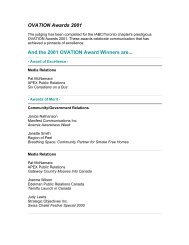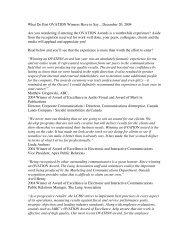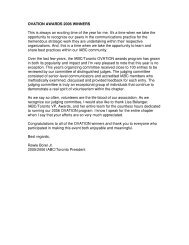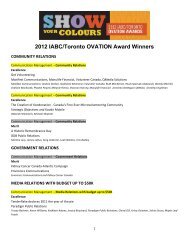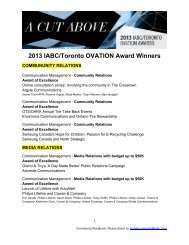Communicator
Communicator - IABC/Toronto
Communicator - IABC/Toronto
You also want an ePaper? Increase the reach of your titles
YUMPU automatically turns print PDFs into web optimized ePapers that Google loves.
Digital<br />
Dialogue<br />
Sticking to those resolutions takes determination,<br />
focus and sheer will. For the online communicator,<br />
the same holds true.<br />
After meeting with a group of my online communicator-type<br />
pals at the gym yesterday, over celery sticks<br />
and chocolate bars, we came up with a list of seven<br />
resolutions to which we believe every communicator<br />
involved in the World Wide Web should pay heed.<br />
1. Develop a strategy – This should come as no<br />
surprise. As professional communicators, this is<br />
where we always start. The web is no exception.<br />
Whether it’s old-school online initiatives (such<br />
as your website or e-mail newsletter) or a social<br />
media campaign on Facebook or Twitter, all<br />
digital communications efforts must be mapped<br />
to your organization’s mission and support the<br />
overall business plan. Otherwise, it may be a<br />
cool idea, but what’s the point?<br />
2. Prioritize communication channels – As communicators<br />
we’ve hit the jackpot. There have<br />
never been more communication channels from<br />
which to choose. While we revel in abundance,<br />
Resolutions of<br />
Highly Effective<br />
Online<br />
<strong>Communicator</strong>s<br />
7If you’re like me, the New Year is a time to shed those<br />
bad habits of yesteryear, and look ahead with optimism:<br />
I will eat more veggies… I will exercise more than once<br />
a month… I will stop eating chocolate.<br />
sometimes it can be daunting and downright<br />
confusing. The key is to look to where your<br />
audience goes for information and focus your<br />
efforts there. If your audience is job seekers, focus<br />
on building an amazing online recruitment area<br />
within your website, post job openings to online<br />
job boards and use social media sites (such as Twitter,<br />
Facebook and LinkedIn) to spread the word.<br />
3. Connect all communication channels – Build<br />
your online community and increase traffic to<br />
all other channels by using the cross-promotion<br />
trick. For example, if you’re building subscribers<br />
for your e-mail campaign, include a sign-up form<br />
on your website and promote it on Facebook<br />
and Twitter. If you’re using social media sites to<br />
spread your message, provide a link to your<br />
website and re-use the content on your blog,<br />
your website and Twitter.<br />
4. Write web-friendly content – Content is king.<br />
Period. Unfortunately, even the most dedicated<br />
communications professionals can get caught<br />
up in the technology or sidetracked by design.<br />
Stay focused on your message and write your<br />
copy in a way people can easily scan<br />
online. By treating your content<br />
as an asset, you’ll be well on your<br />
way to building a meaningful and<br />
successful online presence.<br />
5. Evaluate. Evaluate. Evaluate. – If you<br />
can’t measure it, you can’t manage<br />
it. Establish benchmarks. Set goals.<br />
Track results. Make adjustments.<br />
Evaluate by monitoring web traffic<br />
(i.e. number of visitors and pages<br />
most visited), tracking the number<br />
of e-mail subscribers or measuring<br />
the size of your communities on<br />
Facebook, Twitter and elsewhere.<br />
Report these findings to internal<br />
stakeholders to keep them engaged<br />
in your online communications initiatives.<br />
Such measurements prove<br />
that your strategies are working<br />
and it’s money well spent.<br />
6. Remember your user – The digital<br />
area can be a very lonely place.<br />
Unless you develop a clear picture<br />
of your target audience and build<br />
your online initiatives around<br />
their needs, they’ll be gone (if they<br />
ever came in the first place). If it’s<br />
a website, figure out what tasks<br />
they want to achieve or the information<br />
they truly need. If it’s a<br />
blog, find out what topics are<br />
timely and relevant. If it’s a tweet,<br />
provide your followers with links<br />
to information of particular use.<br />
Stay focused on your user and<br />
they’ll come back for more.<br />
7. Participate – Join the online<br />
conversation that’s going on with<br />
other digital communications<br />
professionals. Comment on blogs.<br />
Follow on Twitter. Connect through<br />
social media communities. To keep<br />
pace, you have to keep talking.<br />
Putting these online resolutions to<br />
work will pay off in the long run. Now<br />
all you have to do is eat right and go<br />
to the gym.<br />
Valeri Hall Little is an online communications<br />
specialist with more than 15 years in<br />
the digital arena. As president and founder<br />
of intandem communications, she has<br />
helped hundreds of companies implement<br />
strategies to make their websites more<br />
effective and easier to use.<br />
http://toronto.iabc.com/ <strong>Communicator</strong> January – February 2010 9



